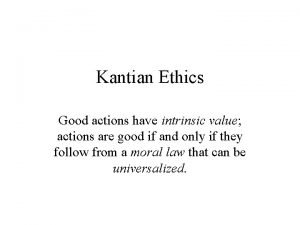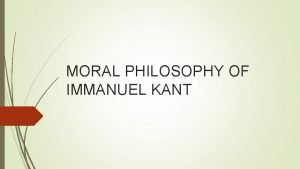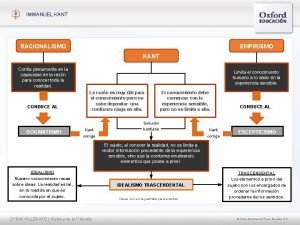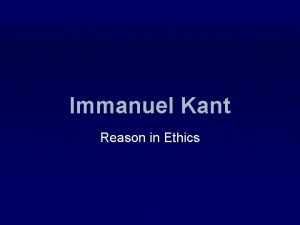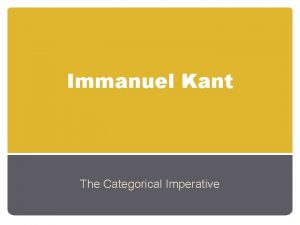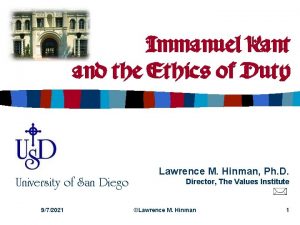Immanuel Kant and the Ethics of Duty University























- Slides: 23

Immanuel Kant and the Ethics of Duty University of San Diego 12/13/2021 Lawrence M. Hinman, Ph. D. Director, The Values Institute ©Lawrence M. Hinman 1

Overview Part I. The Ethics of Duty n Part II. Universalizability and the Categorical Imperative Also see these presentations: n Kant and Respect n The Kantian Heritage: An Assessment n 12/13/2021 ©Lawrence M. Hinman 2

Part I. The Ethics of Duty More than any other philosopher, Kant emphasized the way in which the moral life was centered on duty. 12/13/2021 ©Lawrence M. Hinman 3

Two Conceptions of Duty n Duty as following orders – The Adolph Eichmann model – Duty is external – Duty is imposed by others n Duty as freely imposing obligation on one’s own self – The Kantian model – Duty is internal – We impose duty on ourselves n The second conception of duty is much more morally advanced than the first. 12/13/2021 ©Lawrence M. Hinman 4

Duty and Following Orders n “I had known the Categorical Imperative, but it was in a nutshell, in a summarized form. I suppose it could be summarized as, ‘Be loyal to the laws, be a disciplined person, live an orderly life, do not come into conflict with laws’—that more or less was the whole essence of that law for the use of the little man. ” Adolph Eichmann 12/13/2021 ©Lawrence M. Hinman 5

Duty and Self-Interest n The example of Edmund Ross – He voted against Jackson’s impeachment as a matter of duty n The Grocer Example – The grocer with regular customers might be honest just out of self-interest. n Duty and Utility: The Suicide Example 12/13/2021 ©Lawrence M. Hinman 6

Duty and Inclination n Kant was mistrustful of inclinations (Neigungen) as motivations – This was part of his view of the physical world as causally determined n Saw feelings as – Unreliable – Passive – Phenomenal 12/13/2021 ©Lawrence M. Hinman 7

The Man of Duty “Suppose then that the mind of this friend of man were overclouded by sorrows of his own which extinguished all sympathy with the fate of others, but that he still had power to help those in distress, though no longer stirred by the need of others because sufficiently occupied with his own; and suppose that, when no longer moved by any inclination, he tears himself out of this deadly insensibility and does the action without any inclination for the sake of duty alone; then for the first time his action has its genuine moral worth. Still further: if nature had implanted little sympathy in this or that man’s heart; if (being in other respects an honest fellow) he were cold in temperament and indifferent to the sufferings of others—perhaps because, being endowed with the special gift of patience and robust endurance in his own sufferings, he assumed the like in others or even demanded it; if such a man (who would in truth not be the worst product of nature) were not exactly fashioned by her to be a philanthropist, would he not still find in himself a source from which he might draw a worth far higher than any that a goodnatured temperament can have? Assuredly he would. It is precisely in this that the worth of character begins to show—a moral worth and beyond all comparison the highest—namely, that he does good, not from inclination, but from duty. ” --Groundwork of a Metaphysics of Morals 12/13/2021 ©Lawrence M. Hinman 8

Criticisms of the Ethics of Duty n Moral Minimalism – Requirements are not heartfelt n Moral Alienation – Alienated from feelings n Duty and “Just Following Orders” – This is not Kant’s genuine position 12/13/2021 ©Lawrence M. Hinman 9

Part II. Universalizability and the Categorical Imperative Central insight: n What is fair for one is fair for all 12/13/2021 ©Lawrence M. Hinman 10

Living by Rules n Most of us live by rules much of the time. Some of these are what Kant called Categorical Imperatives— unconditional commands that are binding on everyone at all times. 12/13/2021 ©Lawrence M. Hinman 11

Types of Imperatives n Hypothetical Imperative: – “If you want to drive to UCLA from San Diego, take the 405 freeway. ” – Structure: if…then… n Categorical Imperative – “Always tell the truth” – Unconditional, applicable at all times 12/13/2021 ©Lawrence M. Hinman 12

Maxims n Maxims, according to Kant, are subjective rules that guide action. – Relevant Act Description – Sufficient Generality n All actions have maxims, such as, – Never lie to your friends. – Never act in a way that would make your parents ashamed of you. – Always watch out for number one. – It’s ok to cheat if you need to. 12/13/2021 ©Lawrence M. Hinman 13

Categorical Imperatives: Universality n “Always act in such a way that the maxim of your action can be willed as a universal law of humanity. ” --Immanuel Kant 12/13/2021 ©Lawrence M. Hinman 14

Categorical Imperatives: Respect n “Always treat humanity, whether in yourself or in other people, as an end in itself and never as a mere means. ” --Immanuel Kant 12/13/2021 ©Lawrence M. Hinman 15

Categorical Imperative: Publicity n Always act in such a way that you would not be embarrassed to have your actions described on the front page of The New York Times. --Probably not Bill Clinton 12/13/2021 ©Lawrence M. Hinman 16

Categorical Imperatives: Another example n n “I know the questions to ask. It’s the answers I’m after. And what about learning how to live? Isn’t that philosophy too? What’s yours? ” The reply had come easily but, she had thought, with honesty. “To get as much happiness as I can. Not to harm others. Not to whine. In that order. ” Adam Dalgliesh, in reply to Kate Miskin’s question P. D. James, A Certain Justice 12/13/2021 ©Lawrence M. Hinman 17

Classroom Exercises n Most of us live by rules, obedience to which we take as a duty. – What are the most important rules you live by? – What were the most important rules in your family? – What rules have you rejected as you have gotten older? 12/13/2021 ©Lawrence M. Hinman 18

Lying n n Is it possible to universalize a maxim that permits lying? What is the maxim? – It’s ok to cheat when you want/need to? n Can this consistently be willed as a universal law? – No, it undermines itself, destroying the rational expectation of trust upon which it depends. 12/13/2021 ©Lawrence M. Hinman 19

Academic Cheating involves not playing by the rules. Is it possible for the cheater to will his/her maxim as a universal law? n No, because then others (including the teacher) could refuse to follow the rules as well, failing the cheater even with a good grade. n 12/13/2021 ©Lawrence M. Hinman 20

Exceptions n Are exceptions possible for Kant? – Yes, as long as they can be consistently universalized n Examples – The speeding car • We can universalize an exception for something like ambulance drivers – The Gestapo example • Can we universalize a maxim to deceive in order to save innocent lives? 12/13/2021 ©Lawrence M. Hinman 21

Kant and the Alleged Right to Tell a Lie In an essay written near the end of his life, Kant maintained that you are never justified in telling a lie. – Franco-Prussian rivalry – Beliefs about causality—if you do the right thing, you are not responsible for bad outcomes. 12/13/2021 ©Lawrence M. Hinman 22

Conclusion Kant saw that morality must be fair and evenhanded. n The Kantian path offers a certain kind of moral safety in an uncertain world. n 12/13/2021 ©Lawrence M. Hinman 23
 Kantian ethics
Kantian ethics Immanuel kant ethics
Immanuel kant ethics Immanuel kant teori
Immanuel kant teori Imperativo hipotético
Imperativo hipotético El espacio y el tiempo immanuel kant
El espacio y el tiempo immanuel kant Immanuel kant racionalismo y empirismo
Immanuel kant racionalismo y empirismo Biografia de kant
Biografia de kant Critica trascendental
Critica trascendental Sapere aude kant
Sapere aude kant Hypothetical imperative
Hypothetical imperative Ideas of kant
Ideas of kant Kantian morality
Kantian morality Immanuel kant virgin
Immanuel kant virgin Immanuel kant gesamtschule falkensee
Immanuel kant gesamtschule falkensee Kantian triangle of peace
Kantian triangle of peace Fronetisk
Fronetisk Immanuel kant human rights
Immanuel kant human rights Immanuel kant formalismo
Immanuel kant formalismo Contexto historico de immanuel kant
Contexto historico de immanuel kant Immanuel kant human rights
Immanuel kant human rights Sistema solar conclusão
Sistema solar conclusão Immanuel kant
Immanuel kant Juicios analiticos sinteticos a priori y a posteriori
Juicios analiticos sinteticos a priori y a posteriori Immanuel kant
Immanuel kant

